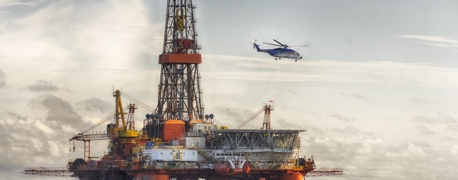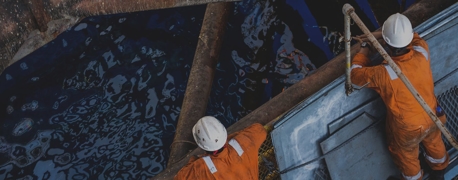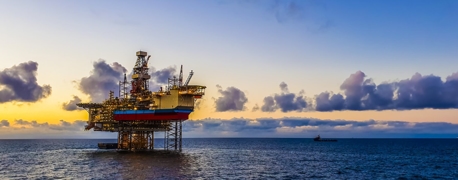Top 4 Injuries Affecting Offshore Oil & Gas Workers

Offshore work has always been dangerous. The environment, the equipment, and the job itself present numerous hazards that can put the most experienced worker at risk. Practices that place more importance on production than safety enhance these risks, making accidents inevitable. Blowouts, explosions, spills, and fires can leave offshore workers with catastrophic injuries that change the course of their lives.
Here, we will take a look at the most common injuries that affect workers in the offshore oil and gas industry, why they happen, and what workers can do to rebuild and recover.
1. Slips, Trips & Falls
Slip and fall accidents are common in any workplace. The same is true in the offshore oil and gas industry. According to a study by the American Club, which provides protection and indemnity insurance for shipowners and charterers, 34% of reported injuries from 2013 to 2017 were caused by slip and fall accidents. Slippery decks, objects in walkways, and other hazards can cause workers to slip, trip, or fall. Rough seas and heavy weather can increase the likelihood of such an incident.
Slip and fall accidents can cause a range of injuries, including:
- Broken bones
- Head trauma
- Spinal cord injury
2. Lifting Injuries
Heavy lifting can cause overexertion and repetitive motion injuries. When offshore workers lift objects that are too heavy for one person to carry, lift improperly, or are required to lift too frequently, this can cause serious muscle strain and other issues. This is a common occurrence in the oil and gas industry and, according to the same American club study listed above, lifting accounted for 28% of injury claims.
Offshore worker lifting injuries may include:
- Back sprains
- Pulled muscles
- Wrist and elbow injuries
- Spine injuries
3. Struck by/Caught in Equipment
Heavy equipment, swinging lines, and complex machinery are prevalent on all offshore rigs. Workers must operate this equipment, man lines, or perform any of a number of tasks in close proximity to these hazards, which increases the chances of accidents where they are struck by or caught in equipment. Winches, booms, and falling or swinging objects can strike a worker and cause serious injury or even knock them overboard. If they are caught in equipment, they can experience crush injuries and lose a finger, hand, or other part of their body. Injuries like these are devastating and often permanent.
4. Burn Injuries
Fires, explosions, and chemical exposure can cause serious burn injuries that leave offshore workers scarred for life. Burns are extremely painful and are difficult to recover from, sometimes requiring multiple reconstructive surgeries and skin grafting procedures. The emotional trauma of a fire or explosion can also cause post-traumatic stress disorder (PTSD) and other psychological injuries, and these incidents can cause inhalation injuries, which may lead to chronic respiratory problems.
Oil & Gas Injuries Result in More Missed Work
One of the most useful statistics tracked by the U.S. Bureau of Labor Statistics (BLS) is “median days away from work.” This is essentially an average of the number of days missed from work as a result of on-the-job injuries or illnesses. Across all industries, the average number of days missed from work for occupational injuries is seven. In the oil and gas drilling industry, however, this number is 30. That 23-day difference shows just how much more serious injuries are for offshore workers. Click here to read more oil and gas industry injury statistics from the BLS.
Offshore Worker Injuries & Fatalities Are Grossly Underreported
While we were able to gather some helpful information regarding offshore injuries, it is difficult to nail down set statistics that offer a clear picture of the dangers that maritime workers face and the injuries they experience most frequently. This is because there is no set system or agency in place that accurately tracks all offshore injuries and fatalities.
Why? Accidents that occur in state versus federal waters are one factor. After the Deepwater Horizon exploded and sank, killing 11 crew members and spilling about 134 million gallons of oil into the ocean, the U.S. established the Bureau of Safety and Environmental Enforcement (BSEE). The BSEE was tasked with improving safety and enforcing environmental regulations in the offshore oil and gas industry. Part of this included tracking offshore fatalities. However, the BSEE is grossly underreporting what we would consider offshore fatalities.
According to a recent investigation of offshore fatality statistics, the BSEE is not tracking or counting:
- Offshore fatalities that occur in state waters (within three miles of U.S. shores).
- Deaths that occur while workers are being transported to offshore platforms or vessels.
- Deaths that are not work-related, even if they occurred because the worker could not receive medical attention due to the remote nature of offshore work.
In April of this year, six people died and seven were never found after a lift boat capsized off the Louisiana coast. These offshore workers were on their way to a lease in the Gulf, but they never arrived. A BSEE spokesperson said their deaths would not be counted toward 2021’s statistics. That is just one example of an incident that did not make it on the BSEE’s reported statistics.
Without a consistent and reliable tracking system, we cannot get a clear picture of how many offshore workers are being injured. We can’t see exactly how many are losing their lives. What our offshore injury lawyers do know is that those who have been injured or lost need a voice. They need an advocate. Arnold & Itkin fights every day to help offshore workers find justice, exposing the wrongdoing that causes accidents and injuries.
If You’ve Been Injured Offshore
If you were injured while working offshore, report your injury and seek medical attention. Then, talk to an attorney. You may be entitled to compensation for your medical care, your lost earnings, and your pain and suffering under the Jones Act or other applicable maritime laws. Your employer may try to pressure you to see a certain doctor or to return to work before you’re ready. They may even threaten to blacklist you, putting you on a so-called “do-not-hire list” if you file a lawsuit. Don’t let yourself get taken advantage of. Involve an attorney and they can handle everything for you, from filing your claim to negotiating for a fair settlement and even helping you find the right doctor.
To find out how we can help you, call (888) 493-1629.


